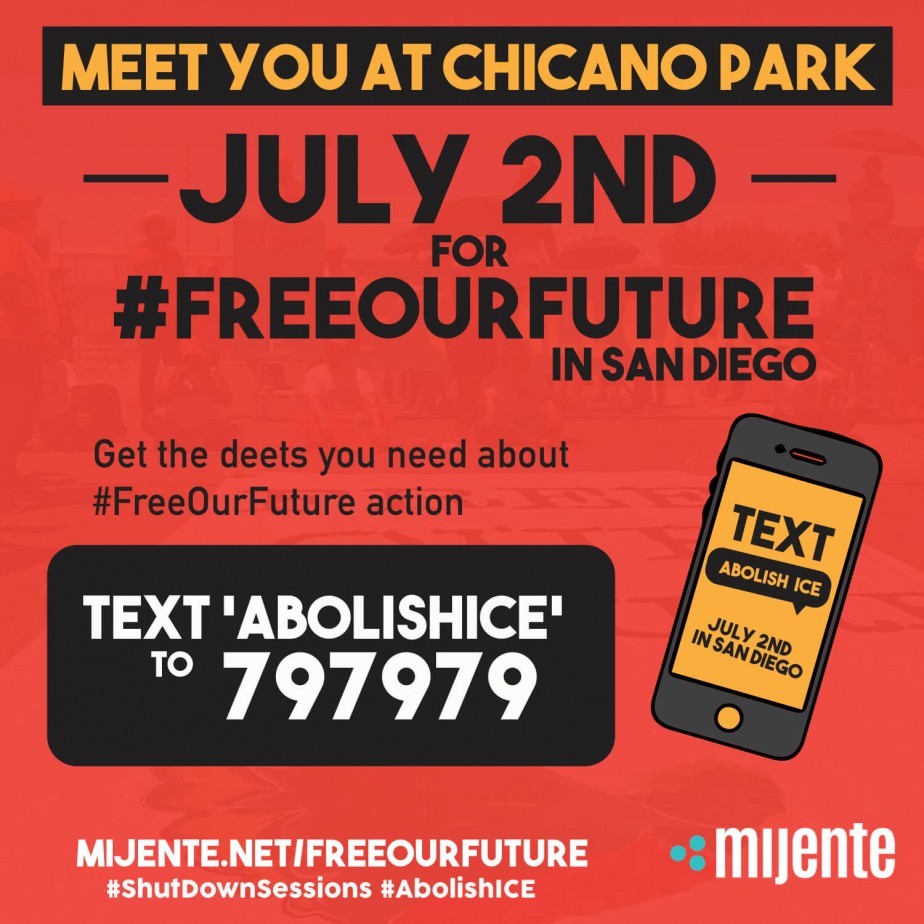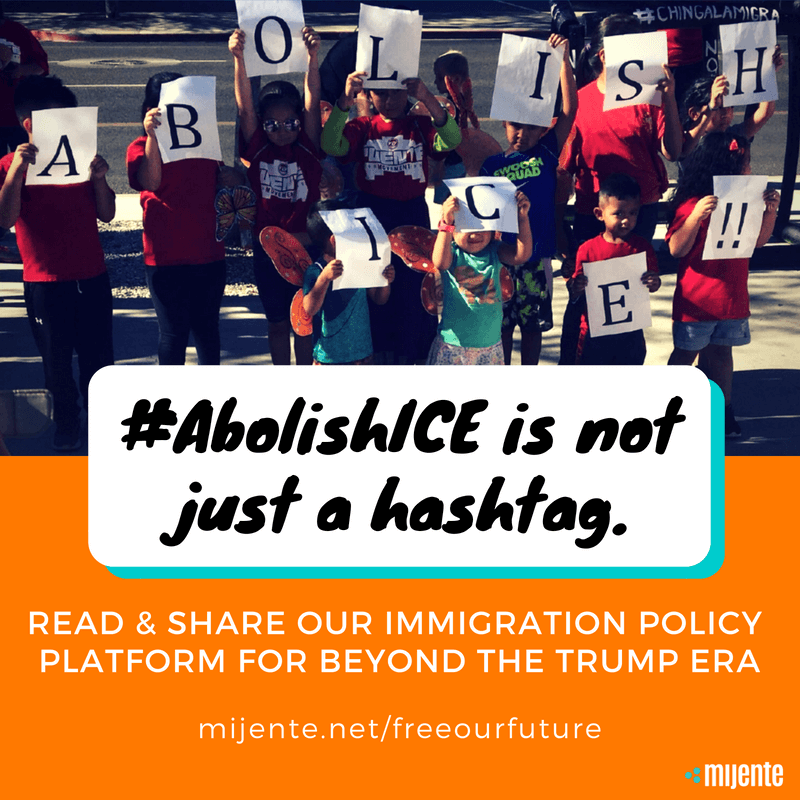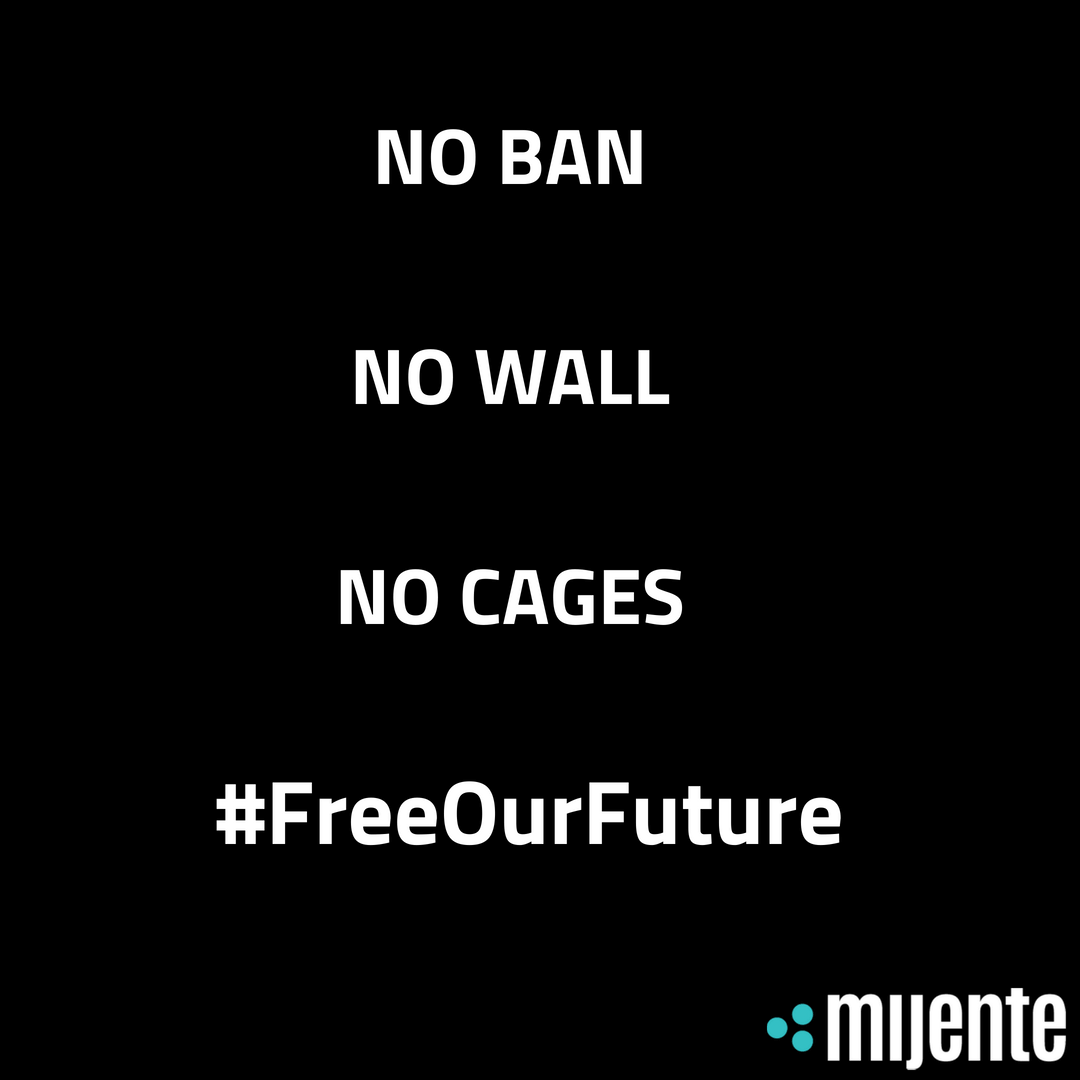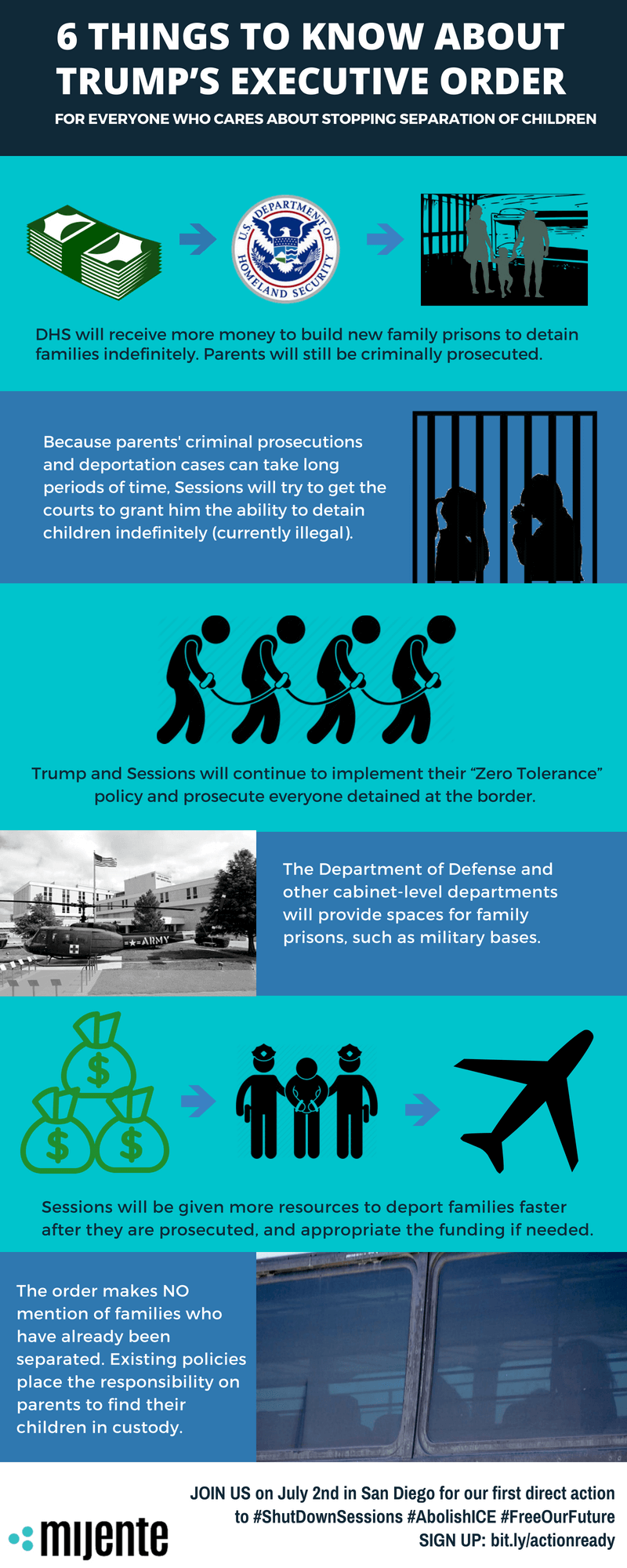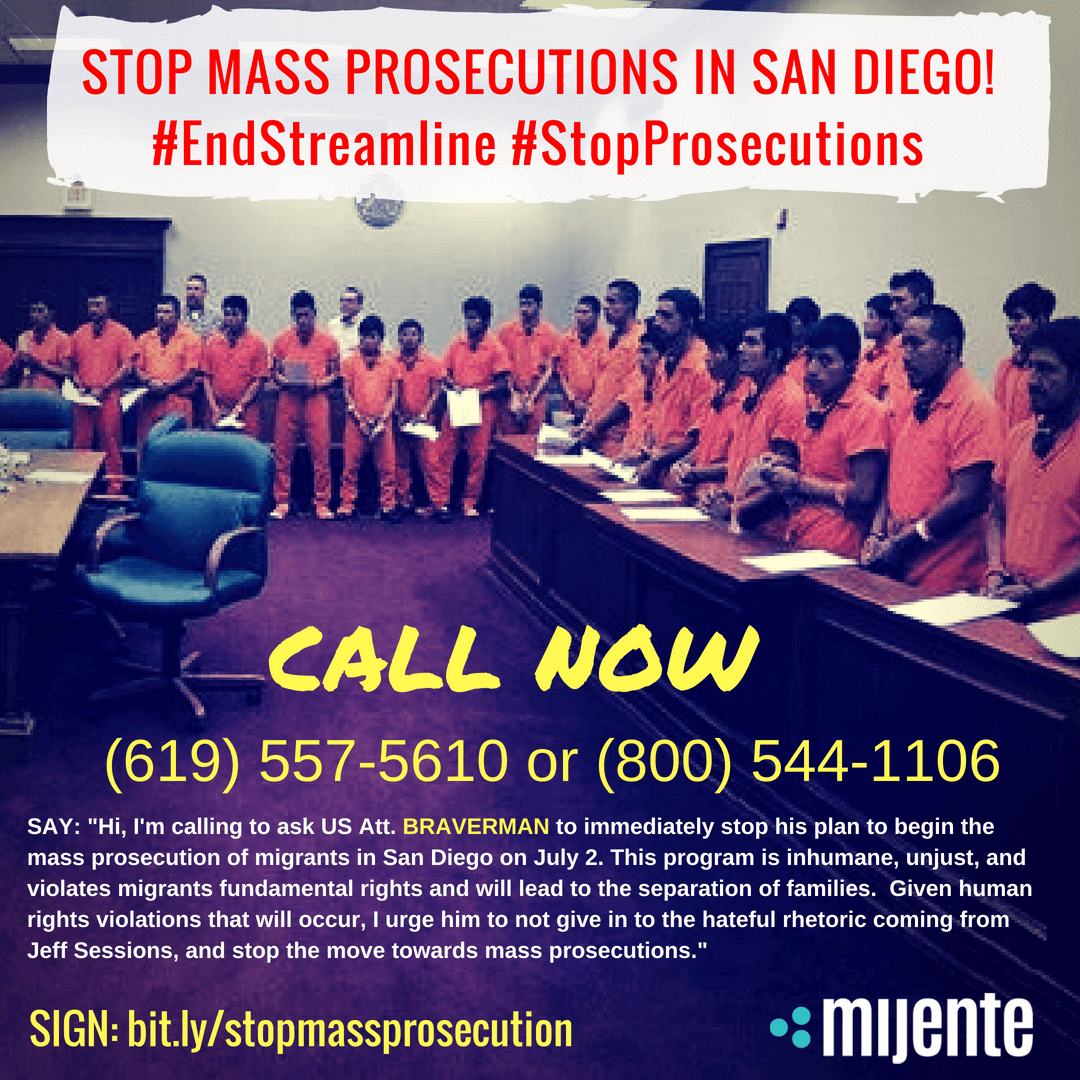These are our Mijente Principles, to help us remember and guide us in struggle.
1. We are Latinx and Chicanx people that are part of movements for justice and self-determination for all people.
We are pro-Black, pro-indigena, pro-worker, pro-mujer, pro-Lesbian Gay, Bi, Trans and Queer, pro-migrant because we hold all of those identities, and because our unity against shared oppressions is central to our vision for change. We cannot sustain and thrive in isolation or in movements that exile parts of our community or expect us to hide who we are to participate. We are Latinx and Chicanx people who want to see our entire community thrive, brought together by a shared consciousness of the challenges we face and a deep seated need for co-development and kinship across identity, generation, language and place.
2. We believe transformative change requires more from us, not just more of us.
It has been predicted that demographic change, particularly tied to the growth of the Latinx and Chicanx community, will lead to progressive change in the United States. But demographics is not destiny. We believe that the transformative change we need is not a given and that both external and internal factors threaten it. Latinx and Chicanx people need to organize, spark, sustain and nurture movements to ensure transformative change happens and combat the ways our community is held back. We see our liberation as bound to Black Liberation, Indigenous sovereignty, economic and climate justice and other liberation movements.
3. We are creating a leaderful space that is accountable, transparent, and continues evolving.
We have too many climbers and not enough lifters. For too long many of those who claim to be leaders of the Latinx and Chicanx community have served themselves first rather than demonstrating the courage to work and live in the service of community lifting itself up. We often see this in elected leaders, but these dynamics are not limited to political office. Trust and power are lost when community leaders are unaccountable, don’t share information, close off input and room for others’ leadership. We need more not less leadership; and we seek to lift up all the different forms of leadership people bring to justice work. We strive for a leader-full space, in which we hold ourselves and each other accountable, share information and resources, listen and implement input. We believe Mijente must be a space where we develop and make room for new and seasoned leaders to continue evolving our political home.
4. We organize people, technology and resources to get the goods.
Our foundational approach to change is through organizing, bringing together people and sustaining collective efforts to achieve change. Sometimes, however, in our work for change we are resistant to change. We cannot deny that technology has deeply impacted how and with whom we are able to communicate, connect or collaborate with. As a result, how we make social change is changing.
We believe our communities and organizing efforts can and should harness the possibilities of new technology, without ever losing the power of in-real-life connections. We believe we can and should examine and innovate on how best to accomplish our goals. Towards these goals we are open to experiment with new partnerships and ways to generate resources beyond philanthropy. We need to build power through organizing in URL and IRL (online and In Real Life) and seek to create digital and physical space for Latinxs to connect and build with each other.
5. We are loyal to our ultimate goal of achieving el buen vivir and self-determine our future, not to singular tactics, strategies, or dogma.
Being ‘right’ or the ‘most down’ is not our ultimate objective. If we understand our problems are systemic, we must also acknowledge that those systems are complex and constantly changing. There are many and changing paths to victory; we therefore must contend for power on all fronts. We build power and challenge it by working outside, against, and from within the state. In that spirit, we recognize that all of us find ourselves living and working within these complex systems and have different gifts and contributions to offer in movement. As individuals and organizationally we will work in different fields and formations as parts of a multi-pronged strategy.
6. We don’t throw each other away.
The word “family” carries significant and sometimes painful meaning. We do not take it lightly and our experiences show us that it is complicated. Whether it is family as determined by blood or family we choose, it takes work. There will be mistakes and growing edges, and they will have impacts. We know everyone is capable of being harmful and of being harmed. Conflict is inevitable and necessary for honest discourse and unity across difference. We believe building a space that can hold disagreement can lead to greater accountability, resilience and antifragility. This means we won’t condone call-outs and exiling each other, or playing oppression olympics with each other. But this also means we don’t allow things to fester inside. The state has often robbed us of our ability to transform conflict and hold relationships with one another. Thus we believe principled struggle is central to our capacity to self-govern and build for the long haul.
7. We acknowledge and value that part of the work is to recover, unlearn, and remember.
We live with the complexities of the present, and with what has been passed down. Like all colonized people we hold that double consciousness of what we have been told versus what we know to be true. Colonization has forced Latinx and Chicanx people to assimilate into values that work against our own self-interest and fragmented who we are for generations. We owe it to those who will follow to do the work towards wholeness, wellness, and healing. Part of this is unlearning lies we’ve been told, remembering who our people are and where we come from, and living the legacy of radical love, resistance, and resilience of our ancestors.
Estos son los principios de Mijente, para ayudarnos a recordar y guiarnos en la lucha.
1. Somos gente Latinx y Chicanx que forma parte de los muchos movimientos de justicia y autodeterminación para todxs.
Somos pro-negrxs, pro-indígena, pro-trabajadorxs, pro-mujer, pro-lesbianas, gay, bisexuales, trans y queer, pro-migrante porque poseemos todas estas identidades y porque unirse en contra de la opresión compartida es fundamental para lograr nuestra visión de cambio. No podemos sostenernos y prosperar en aislamiento o dentro de movimientos que exilian a ciertas partes de nuestra comunidad o que esperan que escondamos quienes somos para poder participar. Somos gente Latinx y Chicanx que quiere ver prosperar a toda nuestra comunidad, unida por medio de una concientización compartida de los retos que enfrentamos y una necesidad profunda del co-desarrollo y la hermandad a través de las identidades, las generaciones, los idiomas y los lugares.
2. Creemos que un cambio transformativo requiere más de nosotros, no solo a más de nosotros.
Se ha predecido que un cambio demográfico, particularmente vinculado al crecimiento de la comunidad Latinx y Chicanx, provocará un cambio progresista en los Estados Unidos. Pero la demografía no indica el destino. Creemos que el cambio transformativo que necesitamos no es un hecho y que lo amenazan factores tanto externos como internos. La gente Latinx y Chicanx debe organizar, desencadenar, sostener y fomentar los distintos movimientos sociales para asegurar un cambio transformativo y combatir las maneras en que se reprime a nuestra comunidad. Entendemos que nuestra liberación está vinculada a la liberación negra, la soberanía indígena, la justicia económica y climática, y otros movimientos de liberación.
3. Estamos creando un espacio de liderazgo que se responsabilice, sea transparente y se mantenga en desarrollo.
Hay demasiadxs trepadorxs y no suficientes levantadorxs. Por demasiado tiempo muchas de las personas que alegan ser líderes de la comunidad Latinx y Chicanx se han satisfecho principalmente a sí mismxs en vez de demostrar la valentía de trabajar y vivir al servicio de la comunidad que se levanta a sí misma. A menudo vemos esto en los líderes electos, pero estas dinámicas no se limitan a los puestos políticos. Perdemos confianza y poder cuando los líderes comunitarios son irresponsables, no comparten información, y se cierran a las aportaciones y al liderazgo de los demás. Necesitamos más liderazgo, no menos; y buscamos promover todos los diferentes tipos de liderazgo que la gente aporta trabajando por la justicia. Estamos luchando por un espacio de liderazgo abundante, donde nos hagamos responsables lxs unxs a lxs otrxs, compartamos información y recursos, escuchemos, y pongamos en práctica las contribuciones de las personas. Creemos que Mijente debe ser un espacio donde capacitemos y hagamos espacio para los líderes tanto nuevos como veteranos y continuemos desarrollando nuestra casita política.
4. Organizamos a las personas, la tecnología y los recursos para conseguir los medios.
Nuestro enfoque fundacional para crear el cambio se define a través de la organización comunitaria, unir a la gente y sostener los esfuerzos colectivos. A veces, sin embargo, en nuestro trabajo por el cambio nos resistimos al cambio. No podemos negar que la tecnología ha impactado profundamente cómo y con quién nos podemos comunicar, conectar o colaborar. Como resultado, la forma en que creamos el cambio social va cambiando.
Creemos que nuestras comunidades y esfuerzos para organizarnos pueden y deben utilizar las nuevas posibilidades de la tecnología, sin perder nunca el poder de las conexiones de la vida real. Creemos que podemos y debemos investigar e innovar las mejores maneras de cómo alcanzar nuestras metas. Para progresar estamos dispuestxs a experimentar con nuevas colaboraciones y maneras de generar recursos más allá de la filantropía. Necesitamos construir poder organizándonos en línea y en la vida real e intentar crear espacios físicos y digitales para que la gente Latinx y Chicanx se conecte y construya entre sí.
5. Somos leales a nuestra meta final de lograr el buen vivir y auto-determinar nuestro futuro y no a ninguna táctica, estrategia o dogma en particular.
Nuestro objetivo final no es tener la razón o ser las personas más comprometidas. Si entendemos que nuestros problemas son arraigados al sistema, también tenemos que reconocer que esos sistemas son complejos y cambian constantemente. Hay muchos caminos hacia la victoria que también van cambiando; por esta razón, nosotrxs tenemos que luchar por el poder en todos los frentes. Nosotrxs construimos el poder y lo desafiamos a través del trabajo que se realiza fuera, en contra y desde adentro del estado. Con ese espíritu, reconocemos que todxs nosotrxs nos encontramos viviendo y trabajando desde estos sistemas complejos y tenemos diferentes talentos y maneras de aportar en este movimiento social. A nivel individual y organizacional, nosotrxs trabajaremos en diferentes campos y formaciones como parte de nuestra estrategia de múltiples enfoques.
6. No descartamos a ningunx de lxs nuestrxs.
La palabra “familia” lleva un significado importante y a veces doloroso. Nosotrxs no lo tomamos a la ligera y nuestras experiencias nos demuestran que es complicado. Ya sea que la familia se defina por una relación sanguínea o por nuestra elección, este proceso requiere trabajo. Habrán errores y crecimiento, y estos mismos tendrán un impacto. Nosotrxs sabemos que todxs son capaces de causar daño y ser lastimadxs. El conflicto es inevitable y necesario para el diálogo sincero y la unión a través de las diferencias. Nosotrxs creemos que al desarrollar espacios que puedan contener desacuerdos podemos lograr una mayor responsabilidad, resistencia y antifragilidad. Esto significa que no toleramos las críticas cuyo objetivo es avergonzar, desacreditar y exiliar al otrx, ó jugar a las olimpiadas de la opresión. Pero esto también significa que no permitimos que las cosas se propaguen internamente. El estado nos ha robado frecuentemente de nuestra habilidad de transformar el conflicto y sostener relaciones entre nosotrxs. Por esta razón, nosotrxs creemos que una lucha basada en principios es central a nuestra capacidad de autogestión y poder construir a largo plazo.
7. Reconocemos y valoramos que parte del trabajo es recuperarse, desaprender y recordar.
Vivimos con la complejidad del presente y con lo que hemos heredado. Como todas las personas colonizadas, guardamos la doble conciencia de lo que nos han dicho contrario a lo que sabemos que es cierto. La colonización ha obligado a las personas Latinx y Chicanx a asimilarse a valores que funcionan en contra de nuestros propios intereses y, por generaciones, ha fragmentado quienes somos. Se lo debemos a las personas que vendrán después hacer el trabajo hacia la integridad, el bienestar y la sanación. Parte de este trabajo es desaprender las mentiras que nos han contado, recordar quién es nuestra gente y de dónde venimos, y vivir el legado del amor radical, la resistencia y la resiliencia de nuestrxs antepasadxs.
Estes são os nossos Princípios de Mijente, para nos ajudar a lembrar e guiar na luta.
1. Somos pessoas Latinx e Chicanx que fazem parte de muitos movimentos de justiça e autodeterminação para todxs.
Nós somos em prol dos direitos dxs negrxs, indígena, trabalhadores, mulheres, lésbicas, gays, bissexuais, trans e queers, e migrantes porque possuímos todas essas identidades, e porque a nossa luta em contra de opressões compartilhadas é fundamental para a nossa visão de mudança. Não somos capazes de sustentar e prosperar em isolamento ou dentro de movimentos que mantêm partes das nossas comunidades no exílio ou que esperam que escondamos quem somos para poder participar. Somos pessoas latinx e chicanx que desejam ver a nossa comunidade inteira prosperar, juntadxs por uma consciência em comum dos desafios que enfrentamos e uma necessidade profunda de co-desenvolvimento e afinidade que atravessa identidades, gerações, línguas e lugares.
2. Acreditamos que a mudança transformativa pede mais de nós, mais do que uma quantidade maior de nós.
Prognostica-se que que uma mudança demográfica, principalmente ligado ao crescimento das comunidades latinx e chicanx, resultará em uma mudança progressiva nos EUA. Mas a demografia não é o destino. Acreditamos precisar de uma mudança transformativa que não é dada e que tanto fatores externos quanto internos a ameaçam. As pessoas latinx e chicanx precisam organizar, desencadear, sustentar e nutrir os movimentos para garantir que uma mudança transformativa acontece e combater as formas que freiam a nossa comunidade. Enxergamos a nossa liberação como diretamente ligada à Liberação Negra, a soberania Indígena, a justiça econômica e climática, e outros movimentos de liberação.
3. Estamos criando um espaço de líderes que é responsável, transparente, e que continua evoluindo.
Tem muita gente que deseja subir e pouca gente para levantar. Já faz tempo demais que muitos dos que se afirmam ser líderes da comunidade Latinx e Chicanx atenderam a suas próprias interesses primeiro em vez de mostrar a coragem para trabalhar e viver ao serviço da comunidade para que possa se levantar. Muitas vezes vemos isso nos líderes eleitos, mas estas dinámicas não se limitam aos cargos políticos. A confiança e o poder vão se perdendo quando os líderes comunitários não têm que prestar contas, não compartilham informação, se fecham a outras perspectivas e ao espaço para outra liderança. Precisamos de mais e não menos liderança; e procuramos elevar todas as formas diferentes de liderança que as pessoas proporcionam no trabalho para a justiça. Procuramos ter um espaço cheio de líderes, onde somos todos responsáveis antes nós mesmos e antes os outros, onde compartilhamos informação e recursos, onde ouvimos e implementamos as perspectivas dos outros. Acreditamos que Mijente deveria ser um espaço para podermos desenvolver e criar espaço para líderes novos e veteranos continuarem a evoluir nosso lar político.
4. Organizamos as pessoas, a tecnologia, e os recursos para resultados concretos.
A nossa forma fundacional de abordar a mudança é através do trabalho de organizar, juntar pessoas e manter os esforços coletivos necessários para levar a cabo a mudança. Às vezes, porém, dentro do nosso trabalho para a mudança somos resistentes à mudança. Não podemos negar que a tecnologia teve um impacto profundo sobre como e com quem temos a capacidade de nos comunicar, conectar e colaborar. Como resultado, a forma que conseguimos a mudança social também está mudando.
Acreditamos que nossas comunidades e esforços para organizar podem e devem usar as novas possibilidades da tecnologia, sem nunca perder o poder das conexões da vida real. Acreditamos que podemos e devemos investigar e inovar as melhores maneiras de alcançar nossos objetivos. Para progredir, estamos dispostos a experimentar novas colaborações e formas de gerar recursos além da filantropia. Precisamos construir poder nos organizando on-line e na vida real e tentar criar espaços físicos e digitais para as pessoas Latinx e Chicanx se conectarem e construírem uns com os outros.
5. Somos fiéis ao nosso objetivo final de alcançar a boa vida e autodeterminação do nosso futuro e não a qualquer tática, estratégia ou dogma em particular.
Nosso objetivo final não é estar certo ou ser as pessoas mais comprometidas. Se entendermos que nossos problemas estão enraizados no sistema, também temos que reconhecer que esses sistemas são complexos e estão constantemente mudando. Existem muitos caminhos para a vitória que também mudam; Por esta razão, temos que lutar pelo poder em todas as frentes. Nós construímos poder e desafiamo-lo através do trabalho que é feito fora, contra e de dentro do estado. Com esse espírito, reconhecemos que todos vivemos e trabalhamos a partir desses sistemas complexos e temos diferentes talentos e formas de contribuir neste movimento social. Em nível individual e organizacional, trabalharemos em diferentes campos e treinamentos como parte de nossa estratégia de múltiplas abordagens.
6. Nós não descartamos nenhum dos nossos.
A palavra “família” carrega um significado importante e às vezes doloroso. Nós não levamos isso de ânimo leve e nossas experiências nos mostram que isso é complicado. Que a família seja definida por uma relação de sangue ou por nossa escolha, esse processo requer trabalho. Haverá erros e crescimento, e isso terá impacto. Sabemos que todos são capazes de causar danos e serem feridos. Conflito é inevitável e necessário para o diálogo sincero e união através das diferenças. Acreditamos que, ao desenvolver espaços que possam conter divergências, podemos alcançar maior responsabilidade, resistência e antifragilidade. Isso significa que não toleramos críticas destinadas a envergonhar, desacreditar e exilar os outros, ou jogar as olimpíadas da opressão. Mas isso também significa que não permitimos que as coisas se espalhem internamente. O estado muitas vezes nos roubou nossa capacidade de transformar conflitos e sustentar relacionamentos entre nós. Por essa razão, acreditamos que uma luta baseada em princípios é fundamental para nossa capacidade de nos governar e construir a longo prazo.
7. Reconhecemos e apreciamos que parte do trabalho é recuperar, desaprender e lembrar.
Vivemos com a complexidade do presente e com o que herdamos. Como todas as pessoas colonizadas, mantemos a dupla consciência do que eles disseram ao contrário do que sabemos ser verdade. A colonização forçou o povo Latinx e Chicanx a assimilar valores que trabalham contra nossos próprios interesses e, por gerações, fragmentaram quem somos. Devemos às pessoas que virão depois de fazer o trabalho para a integridade, bem-estar e cura. Parte deste trabalho é desaprender as mentiras que nos disseram, lembrar quem são os nossos povos e de onde viemos, e viver o legado do amor radical, resistencia e resiliência de nossos ancestrais.

